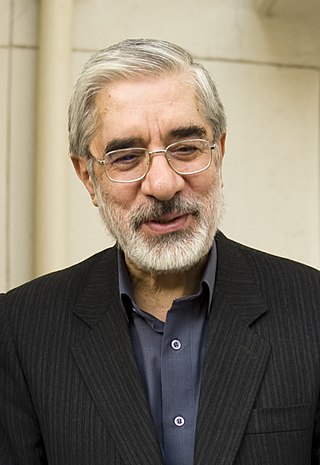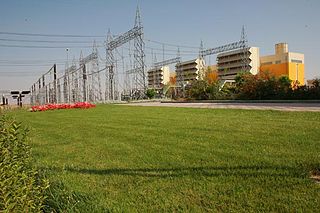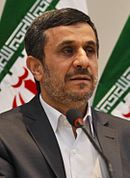Related Research Articles
A fuel tax is an excise tax imposed on the sale of fuel. In most countries the fuel tax is imposed on fuels which are intended for transportation. Fuel tax receipts are often dedicated or hypothecated to transportation projects, in which case the fuel tax can be considered a user fee. In other countries, the fuel tax is a source of general revenue. Sometimes, a fuel tax is used as an ecotax, to promote ecological sustainability. Fuel taxes are often considered by government agencies such as the Internal Revenue Service as regressive taxes.

Grand Ayatollah Hussein-Ali Montazeri was an Iranian Shia Islamic theologian, Islamic democracy advocate, writer and human rights activist. He was one of the leaders of the Iranian Revolution and one of the highest-ranking authorities in Shīʿite Islam. He was once the designated successor to the revolution's Supreme Leader, Ayatollah Khomeini, but they had a falling-out in 1989 over government policies that Montazeri claimed infringed on people's freedom and denied them their rights, especially after the 1988 mass execution of political prisoners. Montazeri spent his later years in Qom and remained politically influential in Iran, but was placed in house arrest in 1997 for questioning "the unaccountable rule exercised by the supreme leader", Ali Khamenei, who succeeded Khomeini in his stead. He was known as the most knowledgeable senior Islamic scholar in Iran and a grand marja of Shia Islam. Ayatollah Montazeri was said to be one of Khamenei's teachers.

The fuel protests in the United Kingdom were a series of campaigns held in response to the rising petrol and diesel fuel prices for road vehicle use. There have been three major campaigns amongst many other protests in the 21st century. The first major protest in 2000 was primarily led by independent lorry owner-operators. One group of lorry owner-operators from the South East of England formed a protest group called "TransAction" that protested at oil refineries and fuel depots in Essex. Protests and blockades of oil facilities caused widespread disruption to the supply of petroleum products. The aim of the protests was to secure a reduction in the fuel duty rate on petrol and diesel, which the government refused to enact. After the protest ended, the government did announce a freeze on fuel duties, and promised changes would be made to the way that goods vehicles were taxed, which would include the taxing of foreign vehicles operating on British roads.

Mir-Hossein Mousavi Khameneh is an Iranian reformist politician, artist and architect who served as the 49th and last Prime Minister of Iran from 1981 to 1989. He was a reformist candidate for the 2009 presidential election and eventually the leader of the opposition in the post-election unrest. Mousavi served as the president of the Iranian Academy of Arts until 2009, when conservative authorities removed him. Although Mousavi had always considered himself a reformist and believed in promoting change within the 1979 Revolution constitution, on 3 Feb 2023, in response to the violent suppression of Iranians by Ali Khamenei, the Supreme Leader of Iran, he announced opposition to the Islamic Republic constitution and asked for a widespread referendum to fully change the constitution and make a fundamental change in Iran's political system.

Rationing was introduced temporarily by the British government several times during the 20th century, during and immediately after a war.

Carless days was a petrol demand reduction scheme active in New Zealand from July 1979 to May 1980. Introduced by the Third National Government of New Zealand, during the 1979 oil crisis, the scheme prohibited owners of private petrol-powered vehicles to drive on a self-designated day of the week. The enabling regulations were one of several attempts to help the New Zealand economy after the oil shocks of the late 1970s—other such policies included the Think Big strategy.

Hydrocarbon Oil Duty is a fuel tax levied on some fuels used by most road motor vehicles in the United Kingdom; with exceptions for local bus services, some farm and construction vehicles and aviation, which pay reduced or no fuel duty.

National Iranian Oil Refining and Distribution Company (NIORDC) is part of the Ministry of Petroleum of Iran. NIORDC was established on 8 March 1991 and undertook to perform all operations relating to refining and distribution of oil products.

Mahmoud Ahmadinejad is an Iranian principlist and nationalist politician who served as the sixth president of Iran from 2005 to 2013. He is currently a member of the Expediency Discernment Council. He was known for his hardline views and nuclearisation of Iran. He was also the main political leader of the Alliance of Builders of Islamic Iran, a coalition of conservative political groups in the country, and served as mayor of Tehran from 2003 to 2005, reversing many of his predecessor's reforms.

The usage and pricing of gasoline results from factors such as crude oil prices, processing and distribution costs, local demand, the strength of local currencies, local taxation, and the availability of local sources of gasoline (supply). Since fuels are traded worldwide, the trade prices are similar. The price paid by consumers largely reflects national pricing policy. Most countries impose taxes on gasoline (petrol), which causes air pollution and climate change; whereas a few, such as Venezuela, subsidize the cost. Some country's taxes do not cover all the negative externalities, that is they do not make the polluter pay the full cost. Western countries have among the highest usage rates per person. The largest consumer is the United States.

One of the most dramatic changes in government in Iran's history was seen with the 1979 Iranian Revolution where Shah Mohammad Reza Pahlavi was overthrown and replaced by Ayatollah Ruhollah Khomeini. The authoritarian monarchy was replaced by a long-lasting Shiite Islamic republic based on the principle of guardianship of Islamic jurists,, where Shiite jurists serve as head of state and in many powerful governmental roles. A pro-Western, pro-American foreign policy was exchanged for one of "neither east nor west", said to rest on the three "pillars" of mandatory veil (hijab) for women, and opposition to the United States and Israel. A rapidly modernizing capitalist economy was replaced by a populist and Islamic economy and culture.

Iran–Venezuela relations have strengthened substantially in recent years. "Iran and Venezuela are two friendly and united states which pave their ways to further progress and welfare for their nations", according to President Rouhani. The two countries are contemporary strategic allies of the Russian Federation and the People's Republic of China while opposing U.S. hegemony in their respective regions.
The 2007 gasoline rationing plan in Iran was launched by president Mahmoud Ahmadinejad's cabinet to reduce that country's fuel consumption. Although Iran is one of the world's largest producers of petroleum, rapid increases in demand and limited refining capacity have forced the country to import about 40% of its gasoline, at an annual cost of up to USD $7 billion.

The 2008 Cameroon protests were a series of violent demonstrations in Cameroon's biggest cities that took place from 25 to 29 February 2008. The protests followed on the heels of a strike by transport workers, who were opposing high fuel prices and poor working conditions. Further political turmoil had been caused by President Paul Biya's announcement that he wanted the constitution to be amended to remove term limits; without such an amendment, he would have to leave office at the end of his term in 2011. Large groups of youths, whom the opposition Social Democratic Front (SDF) political party and the government blame one another for organising, took to the streets of Douala, Yaoundé, Bamenda, and other major cities, looting and vandalising property. The government sent in troops to crack down on the unrest, and protesters and troops alike were killed. The official government tally is that 40 people were killed, but human rights groups claim that the total is closer to 100. Government figures place damage to property at tens of billions of francs CFA.
Following the 2009 Iranian presidential election, protests against alleged electoral fraud and in support of opposition candidates Mir-Hossein Mousavi and Mehdi Karroubi occurred in Tehran and other major cities in Iran and around the world starting after the disputed presidential election on 2009 June 12 and continued even after the inauguration of Mahmoud Ahmedinejad as President of Iran on 5 August 2009. This is a timeline of the events which occurred during those protests.

2009 Iran poll protests trial refers to a series of trials conducted after 2009 Iranian presidential election. Over 140 defendants, including prominent politicians, academics and writers, were put on trial for participating in the 2009 Iranian election protests. The defendants were accused of orchestrating "colour revolution" in Iran, and "exposing cases of violations of human rights." The trials were widely condemned by world leaders both in Iran and worldwide as a "show trial" with coerced confessions.

The economy of Iran includes a lot of subsidies. Food items, such as flour and cooking oil, are subsidized, along with fuels such as gasoline. However cutting subsidies can cause civil unrest.

The Presidency of Mahmoud Ahmadinejad consists of the 9th and 10th governments of the Islamic Republic of Iran. Ahmadinejad's government began in August 2005 after his election as the 6th president of Iran and continued after his re-election in 2009. Ahmadinejad left office in August 2013 at the end of his second term. His administration was succeeded by the 11th government, led by Hassan Rouhani.

The 2019–2020 Iranian protests, sometimes known as Bloody November or Bloody Aban, were a series of nationwide civil protests in Iran that took place in 2019 and 2020. Initially caused by a 50–200% increase in fuel prices, they occurred as part of the wider Iranian Democracy Movement, leading to calls for the overthrow of the government in Iran and Supreme Leader Ali Khamenei. The protests commenced as peaceful gatherings on the evening of 15 November but spread to 21 cities within hours, as videos of the protest circulated online, eventually becoming the most violent and severe anti-government unrest since the Iranian Revolution in 1979.
In May 2022, ongoing protests in Iran escalated into nationwide civil unrest as a result of government price hikes on staple foods including bread and pasta. The protests were part of a countrywide wave of protests beginning in July 2021. Protests were initially concentrated in the water-stricken province of Khuzestan, but rapidly spread nationwide. Authorities responded by declaring riot control action and blocking internet access.
References
- ↑ "Iran fuel rations spark violence". BBC News. 2007-06-27. Retrieved 2010-01-01.
- 1 2 "Unrest grows amid gas rationing in Iran". International Herald Tribune.
